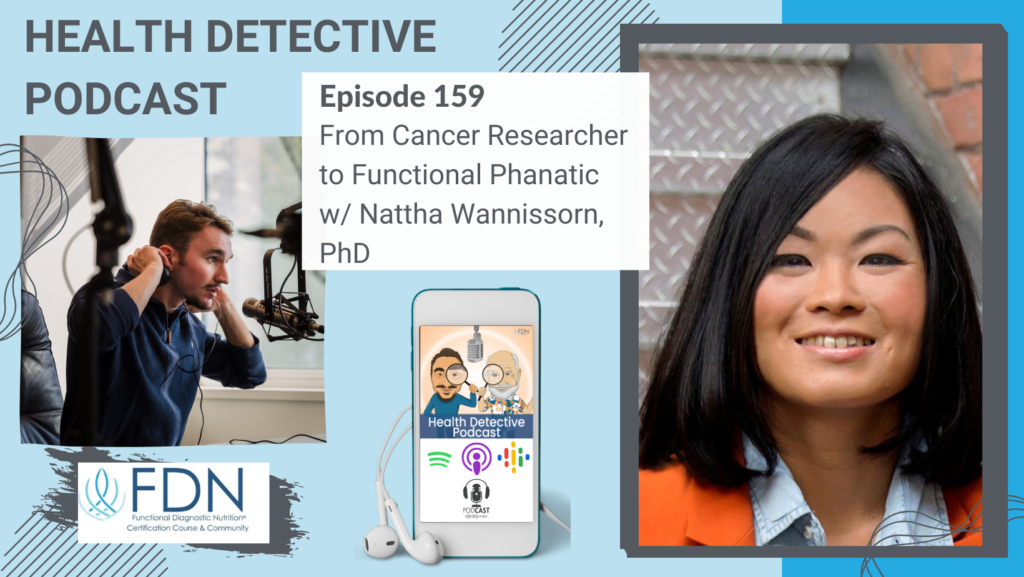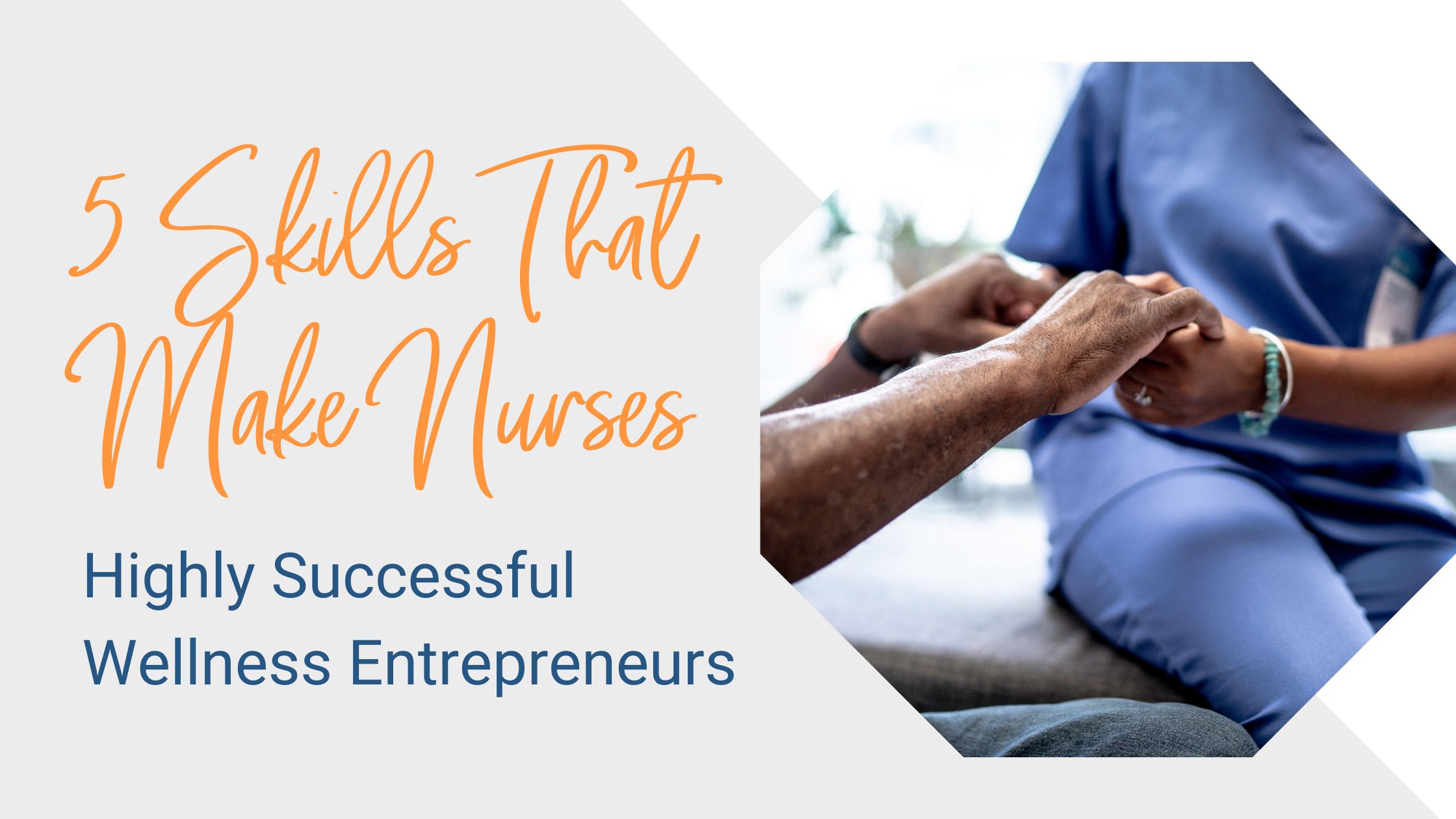Introduction
[00:00:00] Detective Ev: What is going on my friends? Welcome back to another episode of the Health Detective Podcast by Functional Diagnostic Nutrition. My name is Evan Transue, AKA Detective Ev. I will be your host for today’s show where we’re speaking with my friend Nattha Wannissorn, PhD. She went from being a cancer researcher, to being a scientist, and a Functional Diagnostic Nutrition practitioner who helps bring natural health to the general public using online content, copies, and courses. Nattha believes the best way to advocate for natural health is to demonstrate scientific literacy and communicate with integrity.
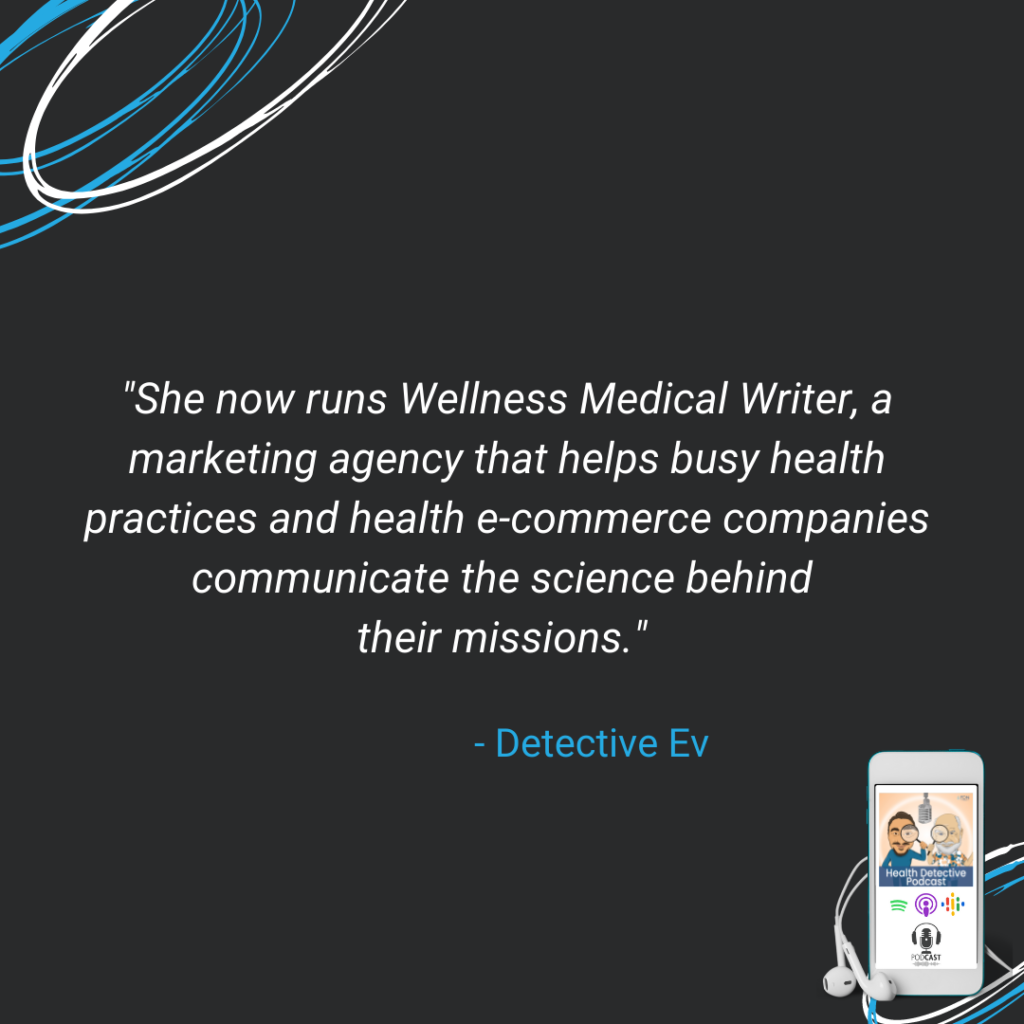
As former Chief Content Officer of the popular health website, SelfHacked and genetic analyzer SelfDecode, she co-created science-based health detective content for over 3 million readers and helped 1000 impossible cases. She now runs Wellness Medical Writer, a marketing agency that helps busy health practices and health e-commerce companies communicate the science behind their missions.
If it’s not already obvious, this is one sharp cookie. Her and I met at the Biohacking Congress (it’s a type of conference), in June of 2022 up in Boston. She was someone who we were just talking with before (I didn’t really know she was an FDN), and then I found out she had graduated from FDN all the way back in 2012.
She’s always integrated that in some way in her current work. She’s got a lot of different certifications, degrees, and FDN is one of them. She now currently resides in Mexico. I think that’s what’s so cool about our line of work. I mean, even though she’s not taking clients directly, per se, she still has the ability to work remotely from anywhere in the world.
Cancer Researcher, Type A, Well Read, and Research Backed
So, she’s hanging out in Mexico City while going and helping people online. I think that’s pretty amazing. When we talk to her today, we’re going to hear about her story of just very Type A personality, super driven, the family kind of push that came and influenced her to push this hard and eventually, kind of made her pretty sick.
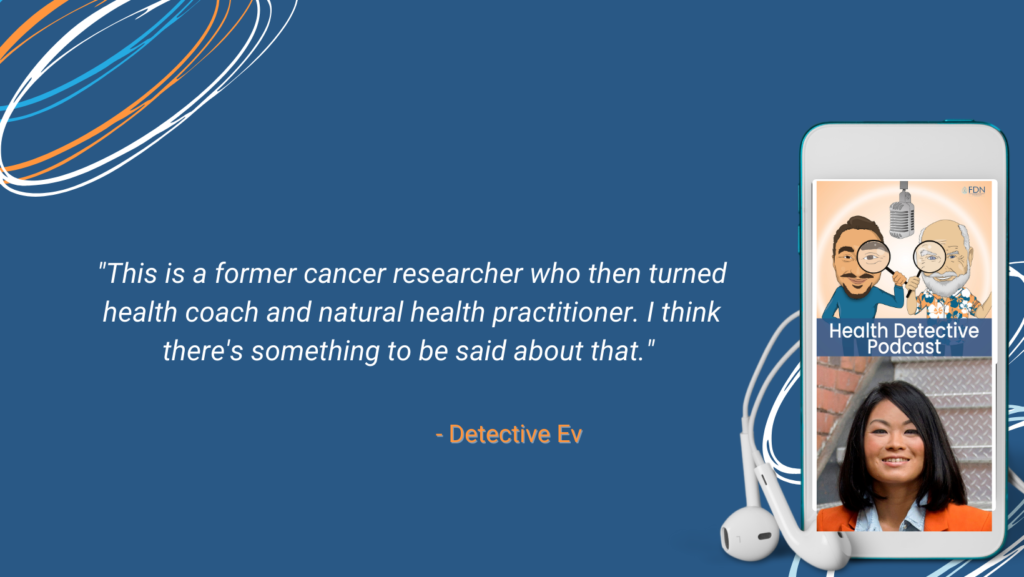
I love people like this who are this smart, this well read, and this research backed, who then get into work like this because these are some of the most credible people that you could ever hear from. This is a former cancer researcher who then turned health coach and natural health practitioner. I think there’s something to be said about that.
I also think there’s a lot to be learned in this episode so I’d like to jump right to it. Without further ado, let’s get to the show.
All right. Hello there, Nattha. Thanks so much for being here with us today.
[00:02:17] Nattha Wannissorn: Yeah, it’s nice talking to you again.
[00:02:19] Detective Ev: All right. We had met at the Biohacking Congress, which is a type of conference in Boston in June of 2022.
I find out that she has been an FDN since 2012, one of the OG FDNS. We’ve had a few of those on the show. It’s kind of amazing how many people there are from that era that are wandering around doing great work and doing good things in the world that I don’t hear of as much. I think FDN is a lot more community oriented now.
Eczema, Steroid Creams, and Antihistamines
If someone goes through and graduates today, it’s pretty hard not to get involved with a bunch of people. But I think it was a little more spread out in the beginning. I meet these cool people still to this day that have been doing this double the time of myself and have very successful businesses and lives with what they’re doing, and I’ve never even heard of them.
So, I’m glad to kind of figure out what your story is today, I only have certain pieces of it. The audience knows that’s my favorite way to do these interviews. I don’t like to know everything; I like to know just enough.
So, I want to start off today, Nattha with the same question that we do with everyone on this show. That is just when did your health symptoms start and what the heck did they look like?

[00:03:23] Nattha Wannissorn: I probably grew up in a lot of it. I realized that I grew up with eczema in the household, and there were steroid creams hidden in every corner. We’d go out for Japanese food or something and there would be antihistamines being passed around.
[00:03:38] Detective Ev: With the salt and pepper, right? Yeah, here’s your Benadryl.
[00:03:40] Nattha Wannissorn: But that was normal. Then I went to grad school. So, I would have antihistamines and all these over-the-counter medications in the drawers, like everywhere. That was how it started as far as I knew.
Pushing, Studying, Not Sleeping
[00:03:53] Detective Ev: Well, I guess the one thing I was going to say, cause it’s always important to me to know this, when you guys were passing out the antihistamines and stuff like that (I mean, you’re a pretty sharp person), was there any thought in your head at that time, at least, that this wasn’t normal or was it so common that you just didn’t think anything about it? Like, hey, this is just what we do.
[00:04:11] Nattha Wannissorn: I’m a surgeon’s daughter and granddaughter. So yeah, to me that was normal. It was what a lot of my family members did, even antibiotics. It felt like it was harmless, even though everyone knew it’s not harmless.
[00:04:23] Detective Ev: Yeah.
So, how does that continue to progress? Because it starts out with this stuff and then you said that you were dealing with that stuff in college. Where does this get to the point where now it’s really becoming a bad part of your life or something that you can’t ignore?
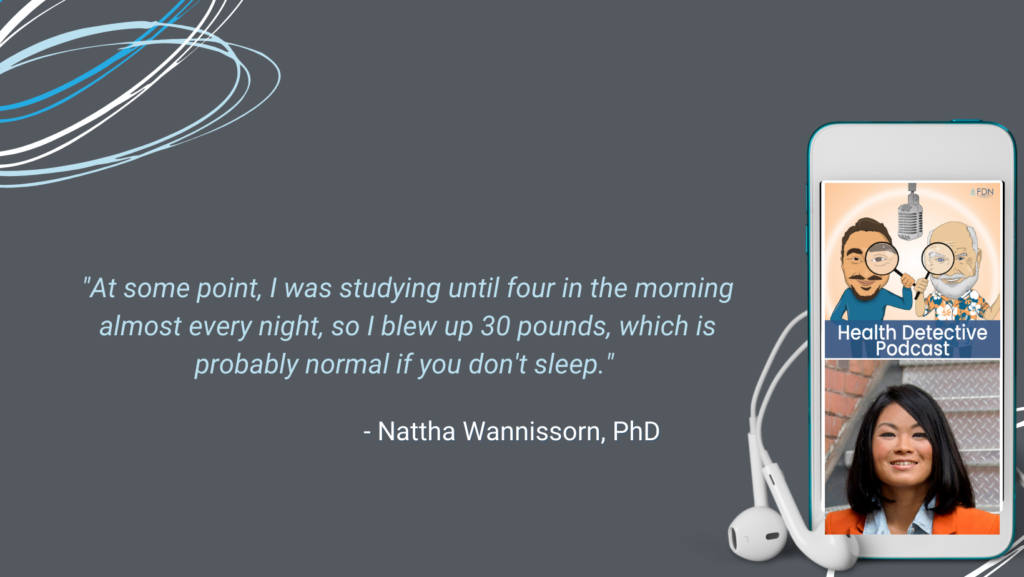
[00:04:36] Nattha Wannissorn: Yeah. II went to college and I was studying really hard. At some point, I was studying until four in the morning almost every night, so I blew up 30 pounds, which is probably normal if you don’t sleep. I graduated, went through grad school, and I looked like this perfect scientist with my life and everything together until like three- or four-years in. My experiments went not working for a couple years, by then, and I started to keep my quarter-life crisis in.
Eczema Impossible to Ignore

I was probably depressed; I didn’t realize it. But how I was operating, I was working really hard, like 14 hours in the lab every day, just to avoid what I was feeling, depressing things that were happening in my life. Until one day, I was like playing racquetball with my feeling. So, oh, this is coming up. Let’s forget about that and start working really hard and plan another experiment. One day I woke up covered in eczema and it was impossible to ignore. Yeah. That was like, oops!
[00:05:29] Detective Ev: Listen, I’m just as guilty of this. It was literally acne that was one of my breaking points. I find it interesting how we could deal with all these symptoms sometimes, but vanity, our very natural vanity, is what gets us. When it’s something that actually looks bad, then we’re like, okay, now I’ll go do something.
So, between a diagnosis I had gotten at 18 mixed with severe cystic acne, all right, now it’s time to do something about the health.
Again, obviously, with the history of your family, you have super smart people involved here. But it’s super smart people that do think in a very conventional way. Were you immediately going to diet and stuff, or were you just like, hey, I need to go do something in the Western medicine world about this?
From Cancer Researcher to Experimenting with Naturopathic Medicine
[00:06:11] Nattha Wannissorn: No. Before that, I was doing personal training and body building. It was partly the body building and taking a ton of fat burners that this landed on my adrenals. And at some point, I was probably drinking six cups of coffee a day just trying to stay awake. That was probably part of the depressive symptoms I was dealing with. I had no energy, but I was trying to hide it.
Well, yes, like before I had patches of eczema here and there and I’m like, I’m just going to get a steroid cream, it’s going to go away. But then it was like covering about half of my upper body, everywhere, and it was excruciating. I did grow up watching my family members using strong steroid creams.
The ones that are in the U.S. have to import the buckets of steroid creams; they only hold like a 500-mil bucket. You can’t get that strength in the U.S. because they were not responding to steroid creams that they could get in the U.S. I’m like, I don’t want that. And 30 years into it, just using the steroid cream, I knew a lot of things were wrong. I was like, this is my fault. I want to fix it naturally.
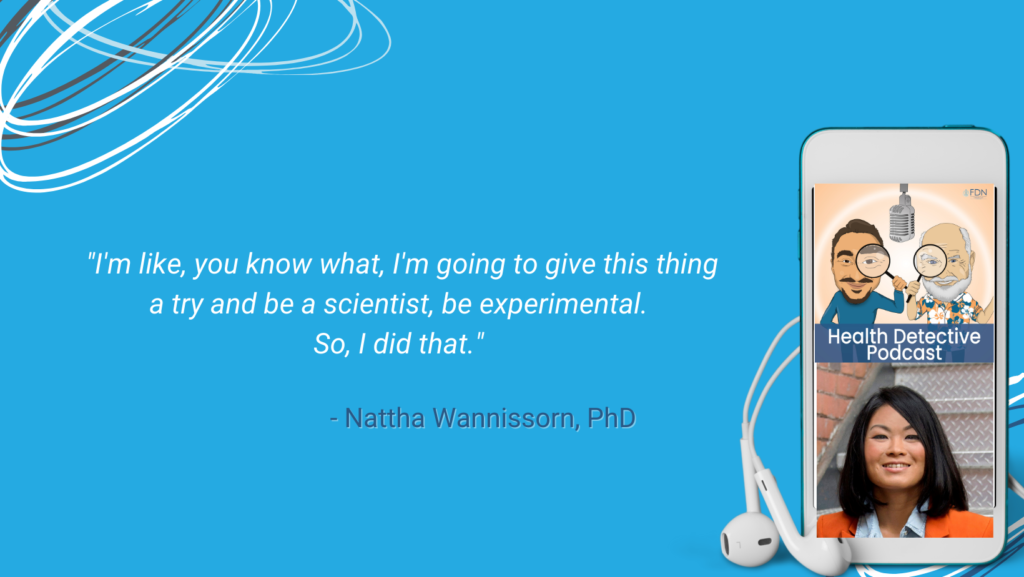
I happened to meet a friend who was going to school for naturopathic medicine. I’m like, you know what, I’m going to give this thing a try and be a scientist, be experimental. So, I did that.
Steroid Cream Addiction?
They suggested an elimination diet. But with the stuff I was going through at the time, I had a lot of emotional eating going on. So, it was really hard for me to stick to the diet, which kind of gave me a lot of compassion now when I’m trying to help people with their food. Once I finally got through with the diet, then I cleared it in about a month. So, I’m actually glad I did that.
One of the things that kept me to the diet and still avoiding steroid creams was I found a group of people. I think it’s called, topical steroid cream addiction. There was like, I think, a Google group or a Yahoo group at the time. The pictures in that group were gruesome. I’m like, I’m glad I found this group. So, I knew before I get on steroids this time.
[00:08:06] Detective Ev: Wait, what is the addiction component? Does the steroid do something?
[00:08:10] Nattha Wannissorn: No. Topical steroids are meant to be used on a short-term basis. You use it, it goes away. And then hopefully when you stop using it, it goes completely away.

There are people who started using it as babies, and then they use it for decades and other people who use it for years. Then this started developing another kind of rash that doesn’t respond to steroids. Or when they put the steroids on the original rash, the other rash becomes stronger. I guess that’s because then you address the gut, the inflammation, and the mind/body part that led to the eczema in the first place.
Don’t Underestimate Simple Diet and Lifestyle Changes
So, you’re playing Whac-A-Mole with your body. It’s like, here’s a dysfunction and you need to address it.
The other thing that steroid creams do is that it makes the immune cells that contributes to the eczema, more potent. So, this is my guess. I’m not sure if their actual studies behind it. But I was looking at how steroid creams affect their regulatory T cells and interleukin 17 and all that cytokine stuff.
I think that’s what happens for these people. The real solution is to get off the steroid creams. Then they get bad flares, and some people go through that for years before they become normal again. That’s in a nutshell, something that I avoided.
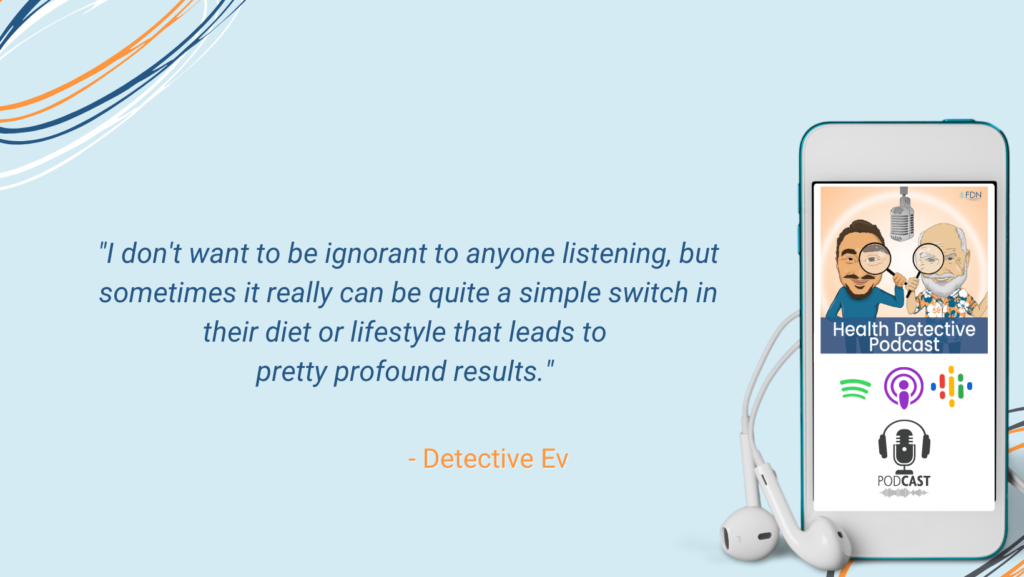
[00:09:24] Detective Ev: I always find it crazy how some of the skin stuff, and this is not universal. I don’t want to be ignorant to anyone listening, but sometimes it really can be quite a simple switch in their diet or lifestyle that leads to pretty profound results.
I find for myself, it’s kind of interesting, even still to this day, like, stress. I just got back from a conference. I’m not a particular fan of flying. The whole thing’s stressful. You’re staying up late. You’re living inside all day. It’s not what I normally do. Even that’ll get like a little breakout for me.
But I was able to knock out 70% of the initial acne that I had in one month by just switching to a more organic, whole foods diet at the time. I mean, I didn’t even really change the stuff I was eating. I lowered sugar a little bit. But from what I recall, I still ate dairy. I still ate gluten. All I did was switch to organic.
From Cancer Researcher to FDN
You can get these profound shifts really easily almost. It’s like the last lingering bit that’s always kind of the tougher parts for people. But guys don’t underestimate if you’ve never done that yet.
I would assume most people listening to this show probably have, but just in case. You don’t underestimate what one month of abstinence from a food that you love could actually really do for your health. It sometimes can change everything around.
That’s really cool that you got lucky enough to meet this friend who was happening to go to school for naturopathic medicine. And thankfully you had an open enough mind to even apply that. There’s plenty of people who know these individuals and they don’t do anything with it.
How did you eventually get to FDN? Because it’s one thing to try an elimination diet based on what a friend says. It’s another thing to say, hey, I’m going to go pursue this course and try to learn more about it directly.
Like how did you find FDN?
[00:10:54] Nattha Wannissorn: I was listening to a bunch of paleo podcasts by that point. Of course, it came across Shawn Croxton. And I went to school for wholistic nutrition. There was a scope of practice where we were only allowed to talk about food. We did learn about labs, but I was curious about the functional labs.

My experience was, I normalized my hormones after going so low in my body fat and into normal. That’s what I was interested in doing. That’s how I came across and became an FDN.
Functional Practitioner, Huge Shift for Cancer Researcher
[00:11:21] Detective Ev: Very cool. It’s interesting how, when I do meet those people from back in the old days of FDN, almost exclusively, they all came from Sean Croton’s podcast. Like everyone was just listening to him back in the day. I guess he was huge.
It’s interesting but I think his podcast retired in 2015. That’s mind blowing to think that this was such a big podcast for this space, this niche space of functional medicine. He retired from that in 2015, and then did something else. You know, I feel like we’re just getting started and there’s so many people that still need to listen to these shows.
And yet, I mean, that guy was just way ahead of his time. He’s got a great show now, I encourage people to go check it out. It’s all about personal development and stuff.
But anyway, you, at one point, you were researching cancer. Right? That’s the kind of work you were doing, correct?
[00:12:02] Nattha Wannissorn: Yeah. Like my entire life I wanted to be a cancer researcher.
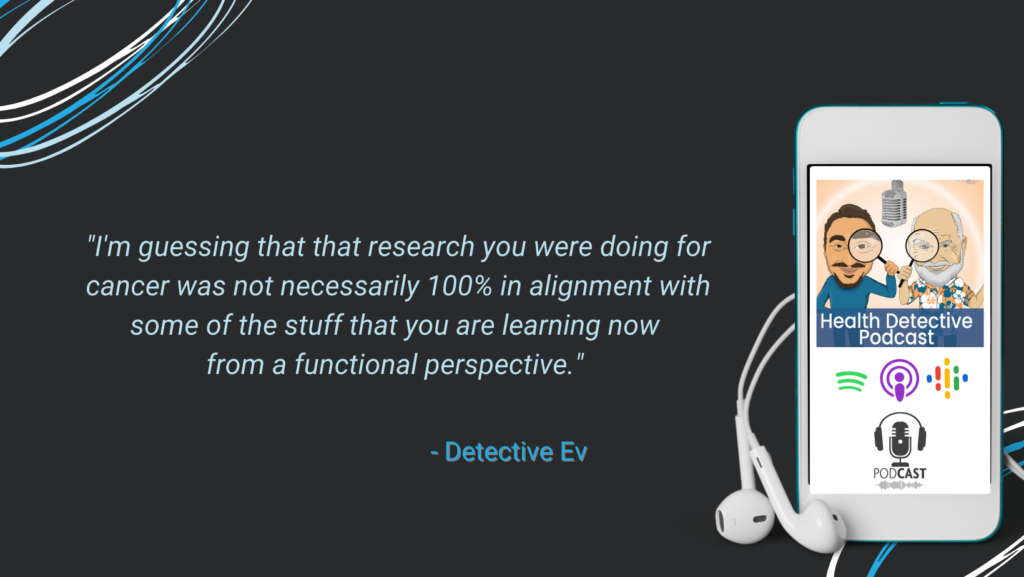
[00:12:07] Detective Ev: Was this a huge mindset shift and paradigm shift when you started adding the more natural stuff in? I’m guessing that that research you were doing for cancer was not necessarily 100% in alignment with some of the stuff that you are learning now from a functional perspective.
The Need to Understand Why

[00:12:22] Nattha Wannissorn: Well, no because like every presentation you started in biology, I mean, if you snoop into my grad school, you start with modern age is correct. You assume that everything you’re observing is correct. Then you try to understand why.
I think that was the standard thought process where like, I got this eczema flare. My body’s correct, let’s try to understand why. But for some reason, when it comes to drug development, it’s the opposite thinking where you’re like your body’s wrong, let’s smack interface and try to cover up the symptoms.
I think the way we do natural medicine or like functional medicine is very much in agreement with the original scientific ways, even though some of the treatments are not entirely scientific.
[00:13:08] Detective Ev: Okay. Very cool. That’s good to know. That’s encouraging.
My aunt, she was diagnosed with cancer. Listen, I understand that when someone catches something late, they need to do what they have to do. I’m not ignorant to that.
It was crazy how fast it was, Nattha. They took her in. She had these headaches; she gets diagnosed with a brain tumor. Within days, they have her undergoing surgery and then within the month or two months, whatever it was, they have her undergoing chemotherapy.
Now, I’m not for or against it. This is a complicated situation, and I’m not pretending that I’m a medical doctor who understands the complexities of something like that.
An Incomplete Form of Treatment
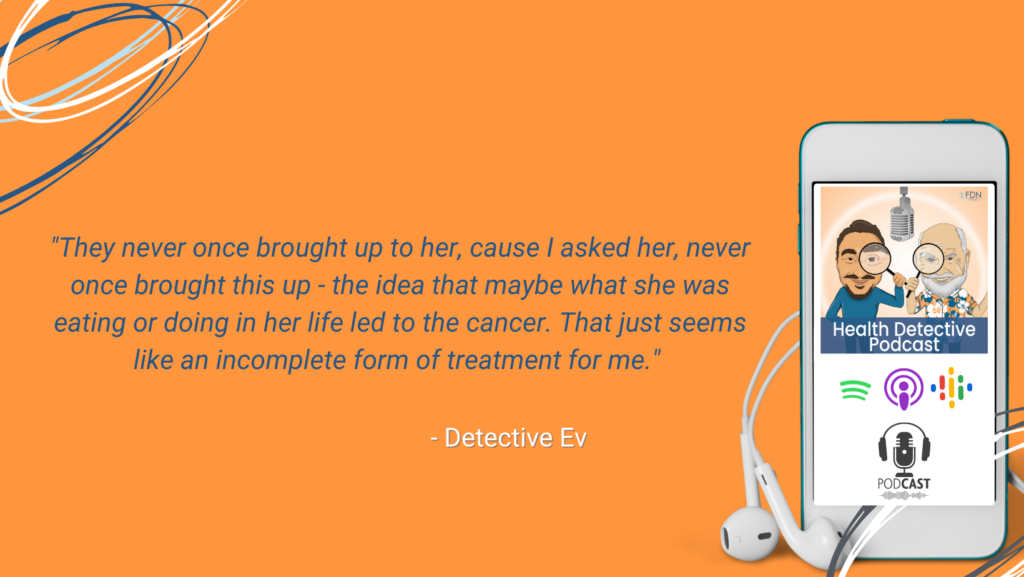
But how we could be doing these things to a human being, going through brain surgery and chemotherapy. They never once brought up to her, cause I asked her, never once brought this up – the idea that maybe what she was eating or doing in her life led to the cancer. That just seems like an incomplete form of treatment for me.
I’m not even advocating necessarily for one way or the other. I’m just saying, I wish it was both. That’s why I asked if the research was different, cause I just don’t see these poor cancer patients in practice actually getting told that, yes, what you put in your mouth also matters. We need to do this surgery right now because you’re pretty banged up, but you need to also prevent this from happening in the future, by changing your lifestyle.
Commercial Break – Common Sense Thinking
Hey folks, it is Detective Ev popping in here really quick. Maybe you’re listening to this episode, and you are like us thinking, wait a second, this is kind of crazy. There are people out there who have these extremely serious diseases, many of the times being caused by lifestyle. Yet they are treated with drugs and surgery that have lots of side effects and could even potentially kill them.
Now I’m not a doctor, so I’m not saying don’t do any of those things. That’s up to you and your doctor, what you think is right, or what might be even necessary depending on where you’re at in your health journey.
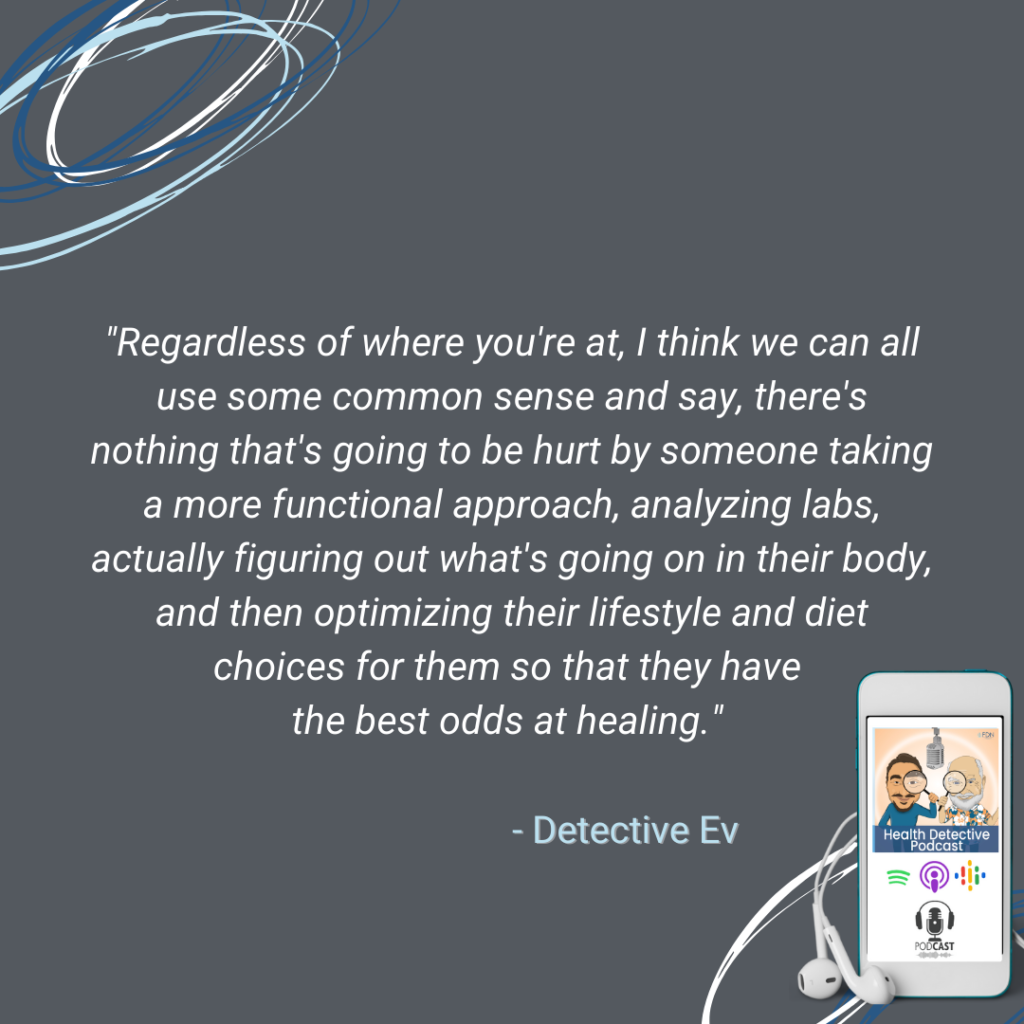
Regardless of where you’re at, I think we can all use some common sense and say, there’s nothing that’s going to be hurt by someone taking a more functional approach, analyzing labs, actually figuring out what’s going on in their body, and then optimizing their lifestyle and diet choices for them so that they have the best odds at healing.
You would think that’s something we can all agree on. Yet we don’t see it practiced nearly enough in today’s modern world.
Commercial Break – Try the FDN Course for Free
Well, if you would like to be a part of that, then go to fdntraining.com/tryfdn and you can now try the FDN course completely for free. There is no credit card required. It is literally free. You get to see if this is for you or not for you.
If it is for you, great, we can take the next steps. And if it’s not, no harm, no foul. We very much hope that you find something that resonates with you. Because if you’re listening to a podcast like this, you’re probably in search of something like this.
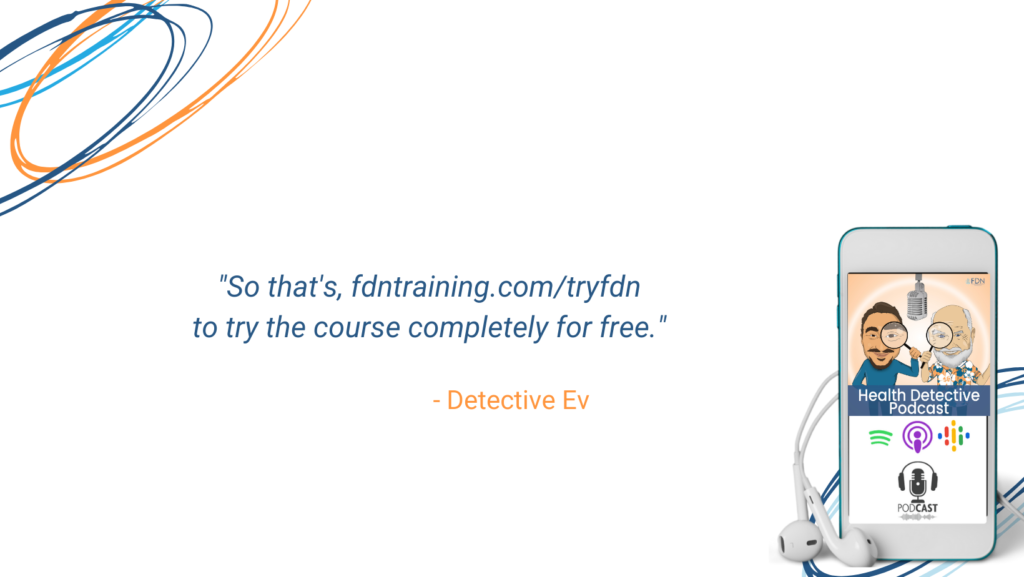
So that’s, fdntraining.com/tryfdn to try the course completely for free.
Okay. Now let’s get back to the episode.
Holding Back Healthy Diet & Lifestyle Benefits
[00:15:38] Nattha Wannissorn: The funny part is there is plenty of research supporting that diet and lifestyle can prevent cancer. It’s even beneficial for healing cancer, but it’s not used. That’s what pisses me off. That’s kinda why I do what I do.
[00:15:52] Detective Ev: Listen, I don’t know what your theory or answer is to this. I’m not trying to get you into some like big, oh my gosh, it’s the pharmaceuticals trying to control this, conspiracy theory. That’s not what I’m saying. But like, what is your idea or theory as to like, if there is research here and people are learning this, why is this not also taught to people like my aunt who got great treatment, seemingly, but was never told something like that? Why is that not happening?
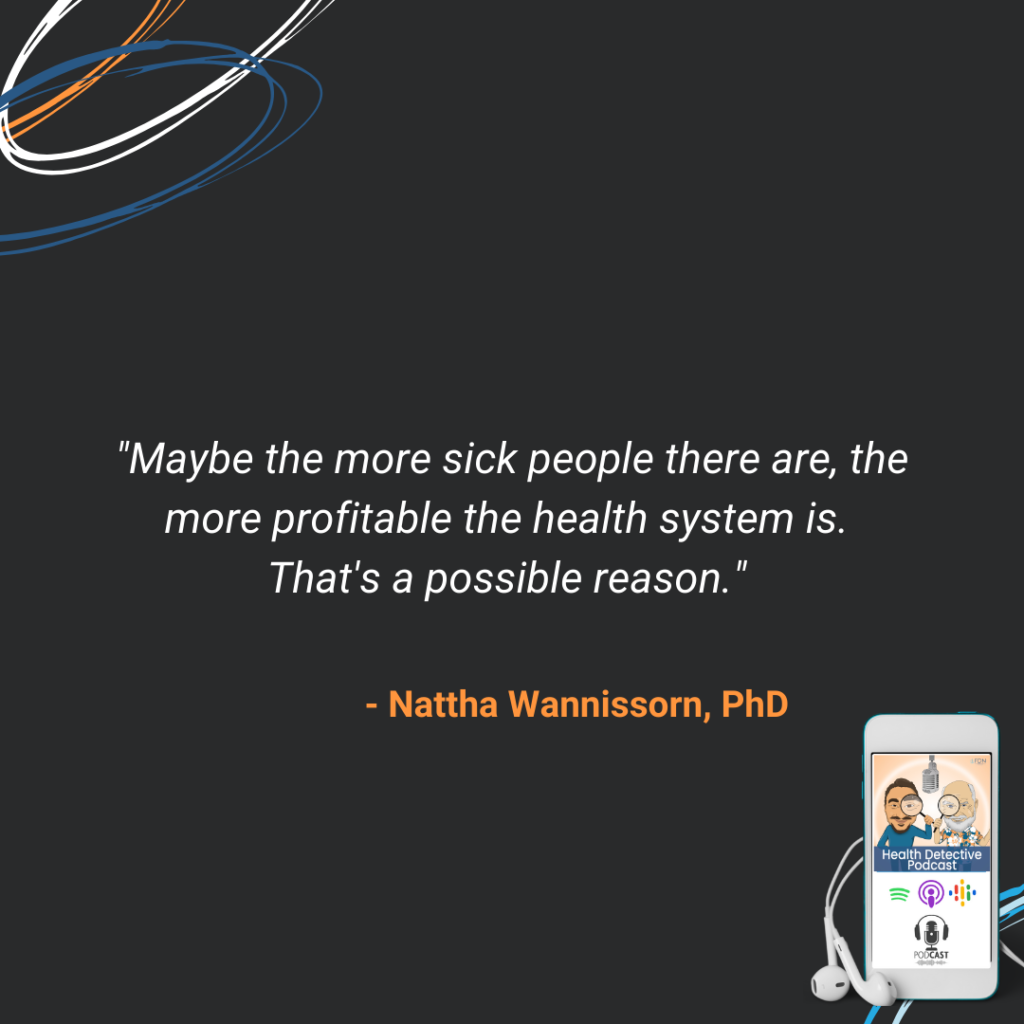
[00:16:15] Nattha Wannissorn: Lots of different reasons, right? Money could be one of them.It could be that their pharmaceuticals are more profitable, so they go in that direction. Maybe the more sick people there are, the more profitable the health system is. That’s a possible reason.
Another thing could be that conventional medicine is extremely fixated on having lap scale, placebo control, randomized trials. It doesn’t take into account enough of the differences between the whole, you know, what’s everyone’s story, what’s your tumor like?
I mean, cancer treatments is getting more personalized. They’re learning to test the genes, the genetic mutations in each of the tumors and typing your drugs specifically, but I don’t think they’re paying attention to the rest of it. Like, someone’s story, how did they develop the cancer, what their lifestyle was like.
Does that answer your question?
Not Enough Trials to Produce Enough Significance
[00:17:03] Detective Ev: Yeah. It does. Well, I guess actually the one thing I’d follow up with is, because you talked about, maybe money being a thing. Right? I do believe that at the highest levels, that would make sense to me. You know, maybe like a psychopathic CEO or something. Okay, fine. We can all picture that. But the doctor that worked with my aunt, I don’t believe that he was a bad person. So, is someone like him just not aware of the research that you’re talking about or like what’s the deal with that?
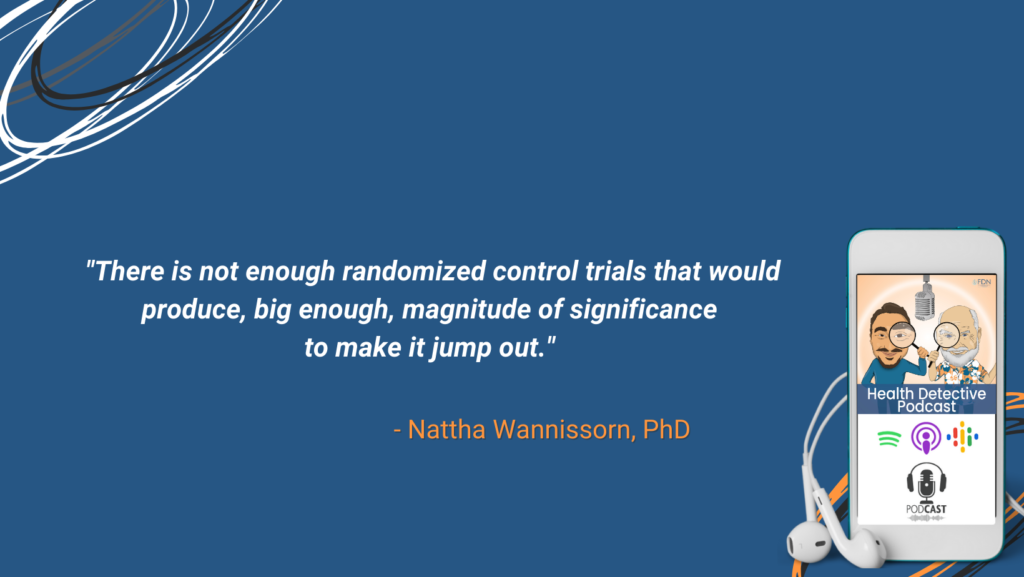
[00:17:26] Nattha Wannissorn: There is not enough randomized control trials that would produce big enough, magnitude of significance to make it jump out.
And you know that natural medicine doesn’t work as a monotherapy. It’s not like you can give them this pill, and it will work. Like, there’s going to be 10 changes at the same time. That’s why conventional medicine has the bias against our kind of medicine.
I hate the word alternative medicine, cause I don’t think it should be alternative. It shouldn’t be emotionally exclusive either. You can do both, you know, like obviously check the drug interactions, but everyone should have access to both.
[00:18:01] Detective Ev: Well, I know that was one of the things you actually kind of wanted to talk about today – why it shouldn’t just be choosing alternative medicine. It seems like you want a system where both of these are kind of integrated together, right?
Like okay. God forbid, let’s say I have cancer. What would my ideal treatment look like in your perfect world if I went to a doctor? You’re like, oh, don’t get me started. You don’t want to know what this would look like.
What Ideal Treatment Might Look Like
[00:18:22] Nattha Wannissorn: Well, this is not medical advice. Right?
Detective Ev: Absolutely not.
Nattha Wannissorn: I don’t want to advise you. But first of all, I would look at what’s going on in my life food-wise, the way you’re living, what kind of carcinogens you’re exposed to. You can get genetic testing to see like what kind of predisposition you have.
You can test the tumors. I did have a client who tested the tumors and then looked at like different natural products that can target the genes and things like that. That’s a possibility. Obviously, I know how to look at the drugs and their clinical studies. So, I want to see like, are they effective? What are the targets? What are their side effects? And all these things.

Take into account all the different options. Some cancers respond better to like plant-based diet, some other cancers respond better to ketogenic diets. So, there is room for personalization there.
I used to be religious about diets, but not anymore.
[00:19:16] Detective Ev: That’s actually interesting to me because, listen, I mean, at FDN, you know how it is. We do advocate for bio individuality, but technically most of the diet recommendations do involve some type of animal protein. And one of the things that I had noticed that I found interesting, and I don’t hear about this all the time, but I have heard about it before, almost exclusively with cancer. I don’t hear this working so well with autoimmunity, but with cancer.
Cancer Researcher Recognizes Both Plant-based & Ketogenic Diets
I have a friend, her name’s Connie, and she had breast cancer. She did no treatment through Western medicine at all, no chemo, no anything. What she did do is she went down to the Hippocrates Institute of Healing in west Palm Beach, Florida, which is raw vegan, guys.
And listen, if you’re going to do raw vegan, I assume that’s probably just about the best way to do it because of what they have at that facility. But she resolved the cancer. It shrunk in like the three weeks that she went there, the tumor got smaller or whatever. She didn’t do anything else western wise, continued the diet, and it was gone within a matter of months.
This remained true for, I don’t know, she’s like 60 now. So, the last 12 years, this has remained true. And Connie has not gotten off the raw vegan diet. Like that’s her thing. So, I’m not, again, not medical advice and I’m not advocating for or against it.
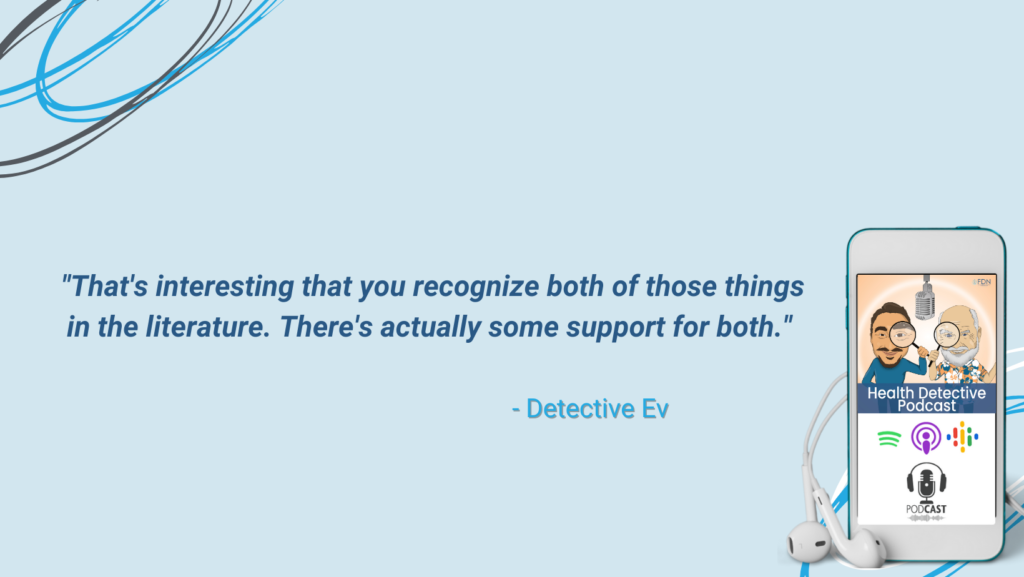
But I always found it fascinating how some people like clearly had benefits to their cancer from a ketogenic diet. There is research behind that. But then someone like my friend Connie is like eating tons of plants and actually a fair amount of carbohydrates and fruits and yet obviously got rid of her cancer through that diet because she didn’t do anything else. There was no other forms of treatment. That’s interesting that you recognize both of those things in the literature. There’s actually some support for both.
Extended Fasting for Cancer Patients Warning
[00:20:47] Nattha Wannissorn: I mean there are toxins in meat and animal products that I actually like to eat.
That definitely removes a lot of the toxins there and increases those nutrients that can support their immune system and reduces the carcinogenic effects. Vegetables can trigger apoptosis for example.
The other thing that I noticed is that every diet comes with its own placebo effect. You know, that’s like when someone changes the diet, they change the belief. Like they believe that something is going to happen. And every raw vegan, specifically, it’s very special. I think there’s something about that that can heal cancer.
[00:21:25] Detective Ev: Absolutely! Bringing up apoptosis and even autophagy, one of the scary things that I saw, and listen, I’m not a researcher like you. I don’t understand this in it’s entirety, but I understood enough to realize, wow, that’s kind of scary. Some people will advocate for fasting, extended fasting for cancer. Many people advocate for it for prevention. From the research I’ve read, I think that’s sound advice.
However, what’s very scary to me is obviously, the way that that’s actually helping cancer primarily is through increased insulin sensitivity, autophagy, and apoptosis. So that’s great. You’re killing off these bad cells, you’re cleaning damaged cells. Awesome.

However, I have seen some stuff now that shows when cancer gets to a certain level, in certain cancers (again, I don’t understand that part), it can actually override autophagy and apoptosis, and now use it to its advantage. That’s kind of scary.
Prevention is the Best Medicine
[00:22:16] Nattha Wannissorn: That’s true. And if you get to a point in your cancer journey, you can get cachexia. So, cachexia, which is like you lose muscles and you gain fat. So, that’s when fasting might not be a good idea.
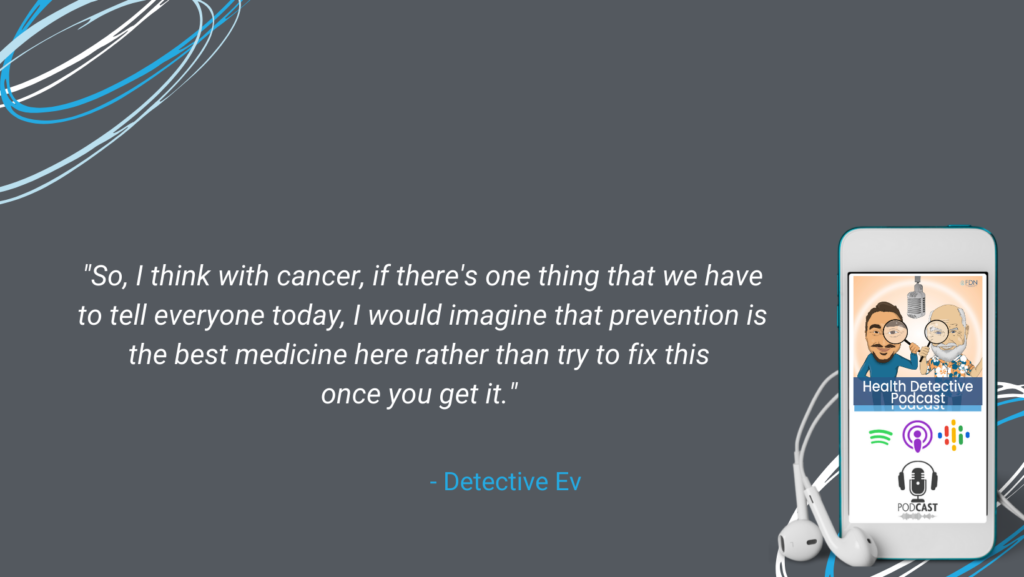
[00:22:29] Detective Ev: Okay. So, I think with cancer, if there’s one thing that we have to tell everyone today, I would imagine that prevention is the best medicine here rather than try to fix this once you get it.
[00:22:39] Nattha Wannissorn: Yeah, exactly. That’s one of the reasons I became a natural health practitioner.
[00:22:44] Detective Ev: We’re going to explore that more and I want to kind of go through that journey.
I want to rewind to FDN really quick and when you went through the course. Now you went through in 2012, it was dramatically different then. Were lab tests included in the tuition back then? Did you run anything on yourself at that time?
[00:22:57] Nattha Wannissorn: No, we paid extra. But yeah, I ran everything.
[00:23:01] Detective Ev: So, you did run everything and you’re going through the system. How did that work for you at the time? And at that point, what were your main symptoms that you were worried about?
[00:23:09] Nattha Wannissorn: My main symptoms was that I started developing histamine intolerance. I had things that I’ve been eating my entire life that I actually enjoy, like paprika. And what else? You know, Thai tea, like that orange color tea. That’s so yummy. Those things made me feel awful just all of a sudden. I was getting strange rashes on my hands and like those things. I’m like, okay, I’m going to check things out.
Stress Management, Regulated Nervous System, and Gut Protocol
I started running all these labs and then did the protocols. I found Blasto in my gut.
One of the interesting things I find is that I have like super high cortisol compared to everyone else. But all my other clients have cortisol in the tank.
You just had to understand at the time. But when someone said, you know, stress causes high cortisol. I was like, maybe that’s not true. You need different levels of interpretation there.
So, I cleaned up the gut, did other protocols, and absolutely nothing changed. Now I realize that, in hindsight, it was because of the way I was living and the way I was dealing with my emotions at the time. I didn’t know how to slow down.
Like, it’s so easy for me to follow any diet. Give me a diet, I implement it, I make it happen. But I didn’t know how to eat slowly. I didn’t know how to slow down. I didn’t know how to feel my feelings. So that was the bigger problem because there was a lot of traumas that were unaddressed and those were the things that kept my nervous system dysregulated.

As time went on, I encountered a lot of people with gut issues and I realized that, a lot of the times, it’s their nervous system that contributed to that for the car not working. See, you need both. You need both the stress management and regulating the nervous system and also the gut protocol.
Identify the Emotional Aspects
[00:24:49] Detective Ev: I’m someone who went through FDN in 2017 and I’ve seen the evolution just since then for us paying attention more to that type of stuff. But I think you make a really great point. And I appreciate your transparency with it because I’m not going to lie. I don’t think we’ve ever had someone come on here and say that the protocols did absolutely nothing. Some have varying degrees of success, for sure, but this is a first. And I believe you, because I feel like just even talking to you in June and then now, you and I seem very intellectually similar.
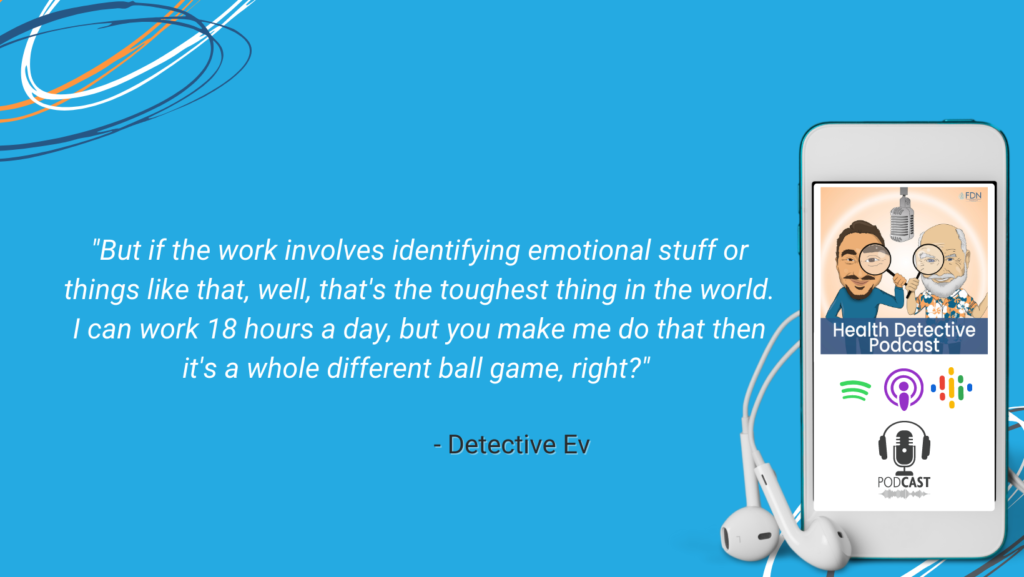
Like, all right, you can give us anything. We’re going to go get it done. We’ll work our butts off. We’ll work to complete exhaustion. But if the work involves identifying emotional stuff or things like that, well, that’s the toughest thing in the world. I can work 18 hours a day, but you make me do that then it’s a whole different ball game, right? It’s stuff that we need to address, and it can be those reasons that we hang on with these health issues.
I think the FDN course now does a great job at like saying, we don’t offer that per se, but you have got to get that checked out. You have got to be working with someone that can do that.
So, when the protocols didn’t do as much as you expected, how long did it take to figure out the whole nervous system and emotional aspect? I’m assuming that wasn’t just the next thing, right? Or was it?
What’s Jamming the Nervous System?
[00:25:55] Nattha Wannissorn: No, it was just the next five to seven years. Like a lot of different things, lots of personality development stuff. Lots of therapy. Different kinds of therapy, all those things.
I learned that I was a colicky baby. I was pulled out of my mom. I was told later, the therapist said, you were stuck. That was because you were stuck. I’m like, oh, okay.
I was pulled out of my mom, was super colicky and it exhausted my parents. You know, if you had a friend with colicky babies, it’s hell for the parents. My mom had postpartum depression.

When babies are born and they were trying to learn to relate to humans, if their parents couldn’t relate to the babies, that’s traumatic. There was a lot of stuff like that that were kind of really jamming my nervous system. It took a lot of practice, a lot of slowing down, to finally get my health in the right place.
[00:26:45] Detective Ev: Got it. What does colicky babies mean? I’ve never heard that term. Like what does that mean?
[00:26:49] Nattha Wannissorn: I think it’s not completely understood. But the baby could have some gas issue, or if they’re not burped properly, or if they have some kind of pain in the body.
Obviously, babies can’t talk so they just cry all the time. So, crying at the top of my lungs. And one of the things about the human brain is that the mother will be wired to respond to the baby. That causes like a persistent fight or flight response for my mom. That’s extremely stressful.
Putting Kids into This Lengthy System
[00:27:18] Detective Ev: All right. Makes sense. I actually worry about that a lot, because I think about how many kids nowadays, especially now, are coming out and they’re sick. They’re sick from day one. They already have metabolic chaos, whether or not they realize it.
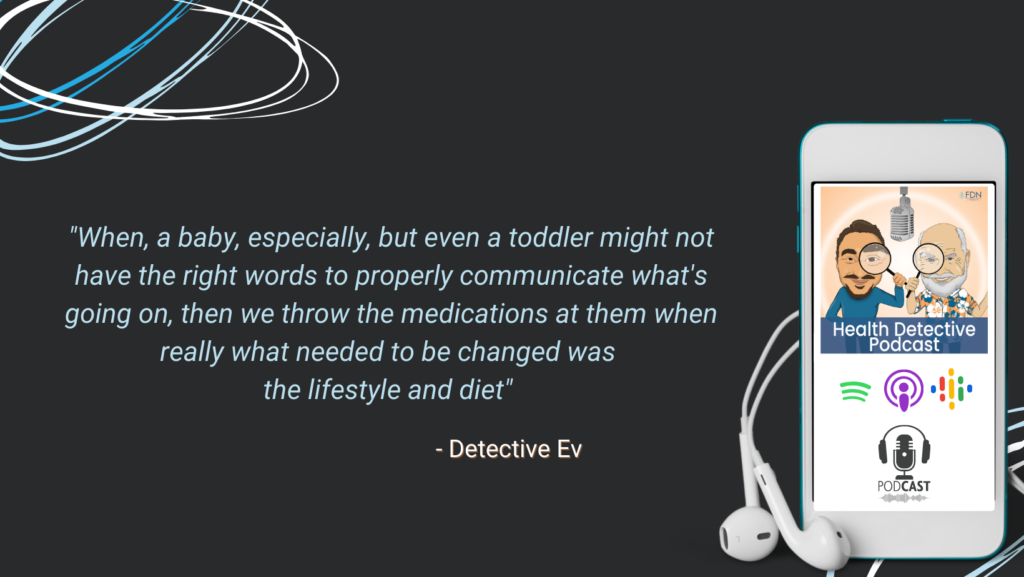
How much of this just seems like behavioral issues or restlessness or never stopping crying? When, a baby, especially, but even a toddler might not have the right words to properly communicate what’s going on, then we throw the medications at them when really what needed to be changed was the lifestyle and diet.
We’re putting kids into this system and they’re going to be in it for a long time if they’re starting out that early. You know there isn’t really a thought around this that, hey, maybe this doesn’t make sense, maybe this isn’t normal. That’s pretty hard for people to break out of that mold.
I know that from interviewing all these people. It’s just universally, if the person’s lucky enough to break out of it, it took years for them to actually say, hey, maybe this doesn’t make sense, or they got really lucky with a family influence or an influence of a friend. But most of the time it takes years before we actually take another route and go off the beaten path with this.
[00:28:20] Nattha Wannissorn: Exactly.
FDN Provides Access to Functional Labs
So, I learned that I had tongue tie. I got a cut at 29. Like, I didn’t swallow correctly for 29 years. It was like, that’s why I was colicky, I couldn’t swallow properly. The breathing wasn’t correct. Then, I got it cut and had to learn to do tongue weightlifting exercises. That’s called myofunctional therapy.
Then I learned that I had some issues with my atlas, the first cervical vertebrae of the spine. That’s one of the things that can cause trouble with babies and cause colic just because it’s really painful and uncomfortable.
[00:28:57] Detective Ev: Okay. So going back to FDN really quick because you’re someone that still says FDN was great, helped them out, but the initial protocols didn’t work for you. In your personal experience, how did FDN help you? Was it from the business side, getting access to the labs? Like where did it best serve you?

[00:29:12] Nattha Wannissorn: Definitely getting access to the labs, understanding how functional medicine works. It’s also important to understand each field that you go into, there’s going to be certain things that you need to know. Like, I was helping menopausal women and I didn’t know much about hormone replacement therapy. It was helping women who were like me, like premenopausal. At the time, I didn’t know anything about birth control, endometriosis, or PCOS, fertility, and all those kinds of things that now I even truly learn.
It’s a really good way to get my foot in the door and helping people think in a different way about their health. They can talk about these diseases. But the way the doctor thinks about it is one way, and you can explain, this is a different way of looking at your hormones and your symptoms. That’s very, very helpful.
A Way of Thinking and a Fair Definition of Health
[00:29:58] Detective Ev: Yeah. You just said it perfectly, cause I always try to describe on this podcast that FDN, in my opinion, more than anything, is a way of thinking. It’s not even the labs, it’s not necessarily the lifestyle stuff. It’s all of that. But it’s the way of thinking first and foremost, that when I see someone with a symptom or a condition or a diagnosis that I know in my head by definition that they cannot possibly be in a state of health. They wouldn’t have a symptom otherwise.
And amazingly Western medicine will still tell plenty of people that they’re healthy even if they’re on one or more medications. Now it depends on the condition, right? I don’t know of any doctor that’s going to say that someone who’s dealing with Hashimoto’s is healthy.
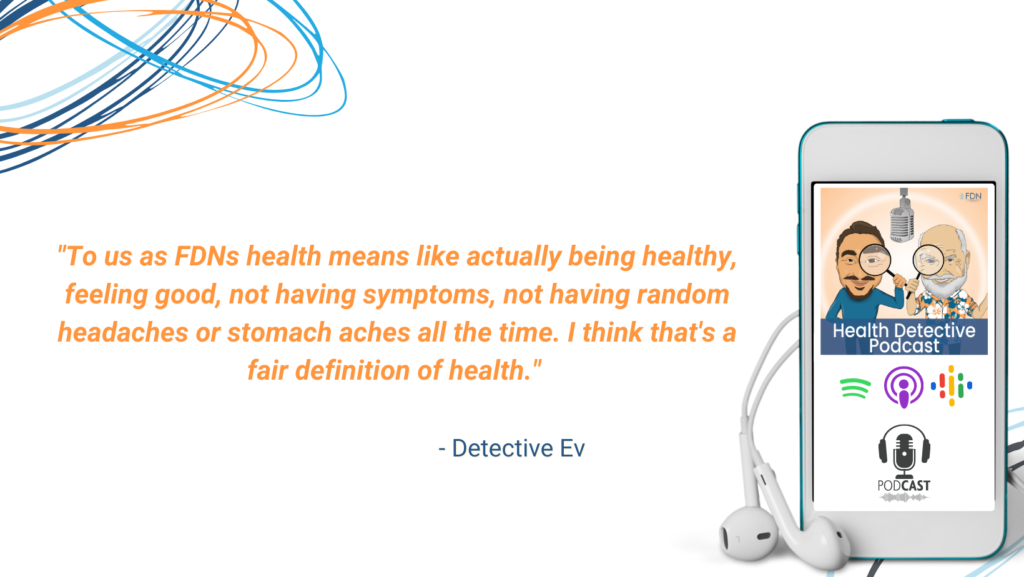
But I know plenty that will say, oh, well, your blood pressure’s super high and we give you this drug. You’re healthy though. Or the cholesterol’s out of whack, but you’re healthy, or whatever it might be. And it’s like, okay, well, what does health mean? To us as FDNs health means like actually being healthy, feeling good, not having symptoms, not having random headaches or stomach aches all the time. I think that’s a fair definition of health.
Remove All the Health-blocking Factors

[00:30:56] Nattha Wannissorn: I think Reed said, when you remove the blocking factors, the body can heal itself. I completely agree with that. It is a stage of development. A lot of really successful FDN practitioners will have like 10 certifications because they’re like me. I was super curious. I always feel like, oh yeah, this is another thing that can help some of the clients.
I learn to read the labs. I learn to do the protocol. Then I learned the fitness. I learned like how to help them do the programs that will help with weight loss and things like that. There are always more things to learn, like core exercise physiology. And I learned mind/body stuff.
There’s a lot of different pieces for sure in terms of like removing the blocking factor. A lot of my clients, I hear it because I’m aware of my own issue with the sleep problems. So, when I look at their profile, I’m like, yeah, this person should get checked for sleep apnea. That’s an added blocking factor that actually bothers a lot of our client base.
[00:31:49] Detective Ev: Got it. I feel like this whole topic of the emotional stuff or whatever, it needs to be addressed to heal. A lot of people say this nowadays. But my question is, did you learn anything along the way that would prevent someone else from not having to wait five to seven years like you did?
Every Client is Very Different
Because you’re pretty smart, clearly never stopped learning. That’s already tough enough for you. I mean, that’s going to be really tough for the average person. Like, are there any clues or hints now that you would give to someone that say, hey, this is definitely something that you need to look at the emotional and nervous system stuff, as opposed to just the labs?
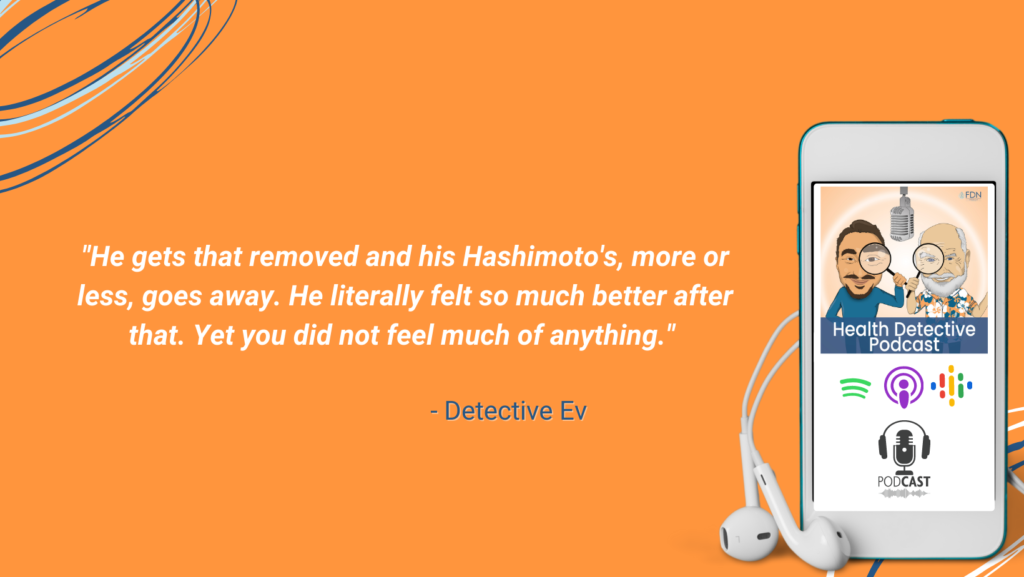
The first person we ever had on this podcast, Ryan Monahan. He goes on, he had a gut issue, he had Blastocystis hominis. He gets that removed and his Hashimoto’s, more or less, goes away. He literally felt so much better after that. Yet you did not feel much of anything.
This just shows how different it can be. Do you have any tips for that?
[00:32:36] Nattha Wannissorn: For learning about like how to regulate your nervous system?
[00:32:41] Detective Ev: Yeah. Well, I guess too, just like identifying that that’s even the problem. I’m sorry to be so long winded, but I’m trying to be clear. Like if I just saw you and Ryan as clients in the same day. I look at your lab results and that’s all I saw. There’s nothing to tell me that Ryan’s going to have dramatic results with this and feel amazing and Nattha’s not going to feel much of anything at all.
I’m trying to figure out if there are other clues that practitioners can look at to figure out, this person needs a little more than just the labs.
Become Aware of the Traumas
[00:33:08] Nattha Wannissorn: Well, first of all, everyone has some degrees of traumas. If someone is extremely Type A and they look perfect at any given time, sometimes I just ask, do you think there’s any emotional things going on or like any recent traumas? A lot of people will have that in the past few years before they had the latest flare.
Do you promote any summits? I think some FDNs talk about summits or there are Biology of Trauma Summits that’s extremely helpful to go through, to spot these signs in your clients.
[00:33:36] Detective Ev: Okay. Cool. I’ve never promoted it, but why not right now? Sounds good to me.
Listen, people are becoming more aware of this in general. Our practitioners, regardless of FDN, are always just up to date with the latest stuff. I think that’s great to let them know about that. There’s a lot of people that I’m seeing in the AFDNP group who are talking about these things and many other topics that are cutting edge. It’s really cool.

[00:33:55] Nattha Wannissorn: There are different levels or things that can happen like in the past, in the past generations. But for me, like at worst, during my childhood. Traumas can also happen when you’re dealing with your symptoms, especially for people who are always on like Facebook and trying to Google and talk about health issues. That’s another type of trauma and it can nail their beliefs that they’re sick and something’s wrong. That’s another type of thing.
For that kind of stuff, something like DNRS would be helpful. I think, dynamic neural retraining system.
[00:34:27] Detective Ev: That sounds good.
How to Look at Scientific Studies
[00:34:27] Nattha Wannissorn: Yeah. Get the head out of their sickness programming. I used to not believe that that was a thing until I read their placebo literature. I think that’s really convincing that it can actually help.
[00:34:41] Detective Ev: That’s one thing I wanted to ask you too, while I had you on. You’re someone who actually goes into the trenches, does the research, knows how to read studies. I understand that there’s more access to studies than ever before. Like I can go on PubMed right now and start looking up stuff, but just because I can look up stuff doesn’t mean that it’s good.
I see a lot of people sharing things that, I mean, from a layman’s perspective look super credible. Then you realize it’s total junk science. So, as a researcher yourself (again, we’re talking to people right now who might be educated, but they’re not PhDs, they’re not out there actually looking at studies), like if I’m on PubMed and trying to find something, what could I do and apply immediately? What should I be looking for in these studies to like to differentiate as to whether or not they’re actually credible and good studies?
[00:35:27] Nattha Wannissorn: Well, there’s so many different levels of evidence, right? Like sometimes a lot of supplements will formulate based on animal studies, but at least you want to look for a well-controlled study.
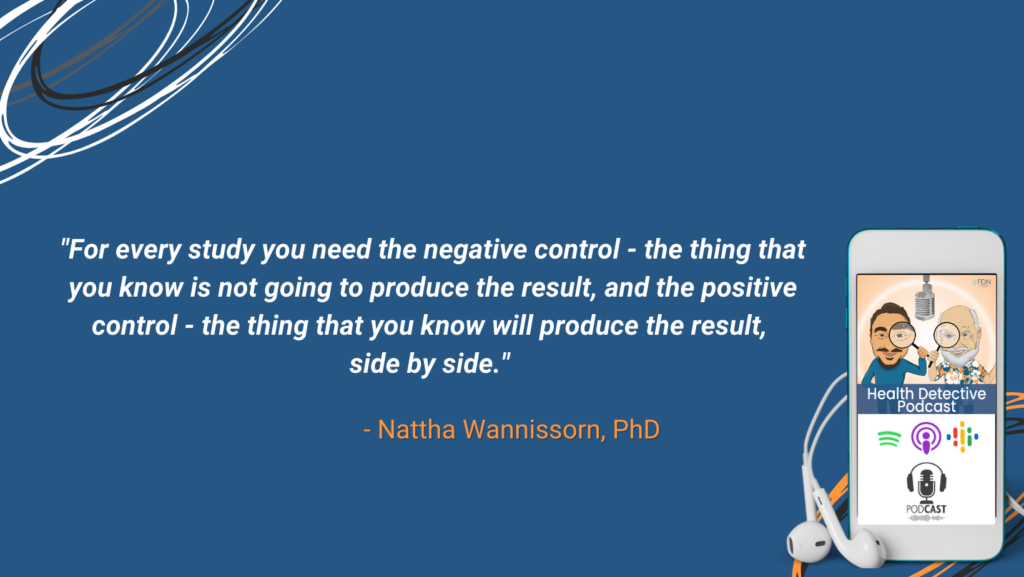
I think I saw a study about grounding and was like, okay, here’s before, here’s after. I’m like, what happened to the control? For every study you need the negative control – the thing that you know is not going to produce the result, and the positive control – the thing that you know will produce the result, side by side.
A Healthy Dose of Skepticism
[00:35:55] Detective Ev: It would probably be wise to check on the quantity of the people and participants in the study. Right? Like if we’re doing this on 10 people, it means a lot less than 10,000.
[00:36:03] Nattha Wannissorn: Yeah, and the sample size. Right? Sometimes it’s animal, sometimes it’s cells, sometimes it’s humans. I think those are all legitimate evidence, but then you want to see if their experiments are done properly.
Then you want to see who sponsored the study.
[00:36:16] Detective Ev: It’s so scary that we even have to worry about this. You’re so right though, because like Monsanto had been caught having ghostwriter researchers act like they did the studies when they didn’t. All this is real, by the way, people can look this up.
It was a guy from Stanford for God’s sake. You know, a highly credible person you would think. You give someone enough money though, and they’ll do almost anything. He literally made a study that was fake. Monsanto did this. How was this company even allowed to operate after that? I have so many questions about this, but we shouldn’t have to worry about that.

It’s just nuts. I know that FDNs are great people and you guys are doing things with the best intentions. That doesn’t mean everyone else is. We need to have a healthy amount of skepticism when we look at these things.
A Failing System and a Sicker Generation
[00:36:58] Nattha Wannissorn: Yeah. I’ve had stages of development. There were times I thought everything has to be puppet and science. I realized that you don’t practice out of PubMed because there’s a people aspect of it. You figure out things that work with your client and then there’s the clinical evidence in your hands. Then there’s their studies. Two different things, but you can use both.
[00:37:15] Detective Ev: Well said. One other thing that we definitely wanted to talk about today cause you’re totally a person to be able to talk about this, is kind of where the conventional system is not serving people so well. I know that you said, especially for women, even, there’s an extra level of lack of care there. In your opinion, where is conventional medicine failing us and women especially?
[00:37:35] Nattha Wannissorn: Well, conventional medicine is failing everyone, both the doctors and the patients. It doesn’t equip the doctors enough to help the patients at the lifestyle level.
I always think a lot of the diseases that we are dealing with, diabetes, hormonal issues, fertility issues, cancer, all these things have the epigenetic component to it. That started from our grandparents’ generation. That’s one of the reasons I think millennials are getting sick at a higher rate.
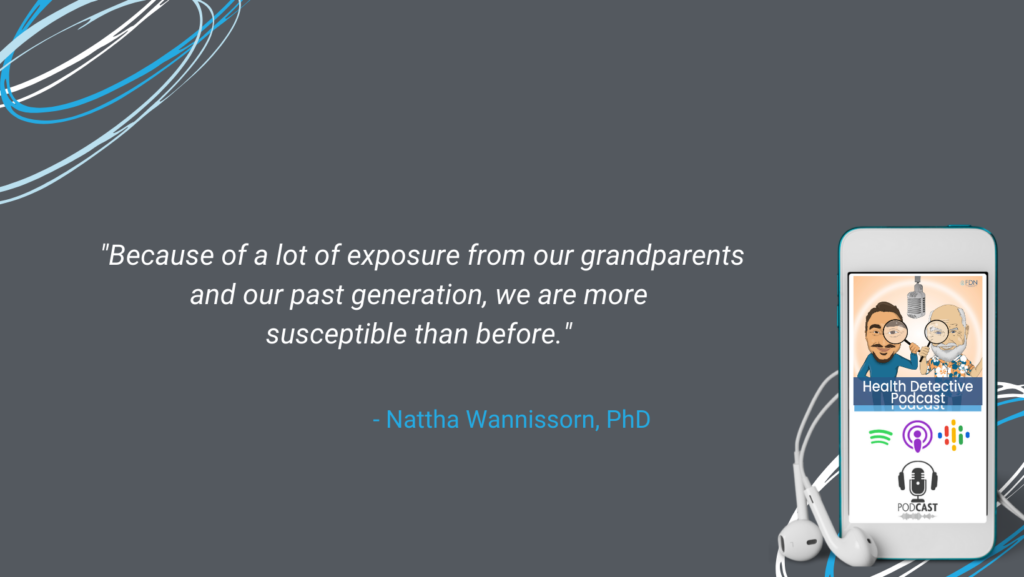
I have friends who are 30 years old, and they are diabetic. I’m like, our parents’ generation, they would have to be much older to be diabetic. Because of a lot of exposure from our grandparents and our past generation, we are more susceptible than before. I feel like conventional medicine was invented in a lot of ways when people were not as sick as they are now.
A Failing System and a Sicker Generation – Men vs. Women
We are sick at the level that we are from the collection of a lot of things, from toxic exposures, nutrient deficiencies, epigenetics from our parents and grandparents, stress and collective traumas we’re dealing with. This is why we are getting a lot of issues that even doctors can’t understand what it is.

Sometimes they just say, it’s in your head. Women are more likely to get that statement than men. The sucky part for men is that they just have to suck it up and not do anything until it’s really bad. Women are more likely to get help. So, a lot of medical providers, even the women get into the habit of telling women that the problems are in the head or something along that line. So, they turn to alternative medicine and that’s really not cool.
Even stuff like, the classic stuff, that conventional medicine pays attention to all the time, like heart attacks. Women die more from heart attacks than men because the symptoms in women are very different.
And there was a time where drugs were developed, like only doing clinical trials in men because women have menstrual cycles and all these things. One of the examples was Ambien. Women metabolized Ambien more slowly than men. So, when Ambien was out, a lot of women had car accidents and died.
When they actually get it out, you needed half the dose of men for the same size, body weight, and other things. Then they would pass a law that they need to do clinical trials across other demographics that will be using the medications.
[00:39:48] Detective Ev: Ambient is a scary drug.
[00:39:50] Nattha Wannissorn: It’s a scary drug. I’m not saying to take Ambien. I’m just saying.
[00:39:53] Detective Ev: I know.
Taking Too Long to Receive a Diagnosis
[00:39:55] Nattha Wannissorn: If you’re a woman, you need to stand up for yourself to your doctor. You need to question why you’re doing things a certain way. For example, an average woman with PCOS has to go through, at least, if I remember correctly, a couple different doctors across a few years to get correctly diagnosed. It’s a sad statistic.
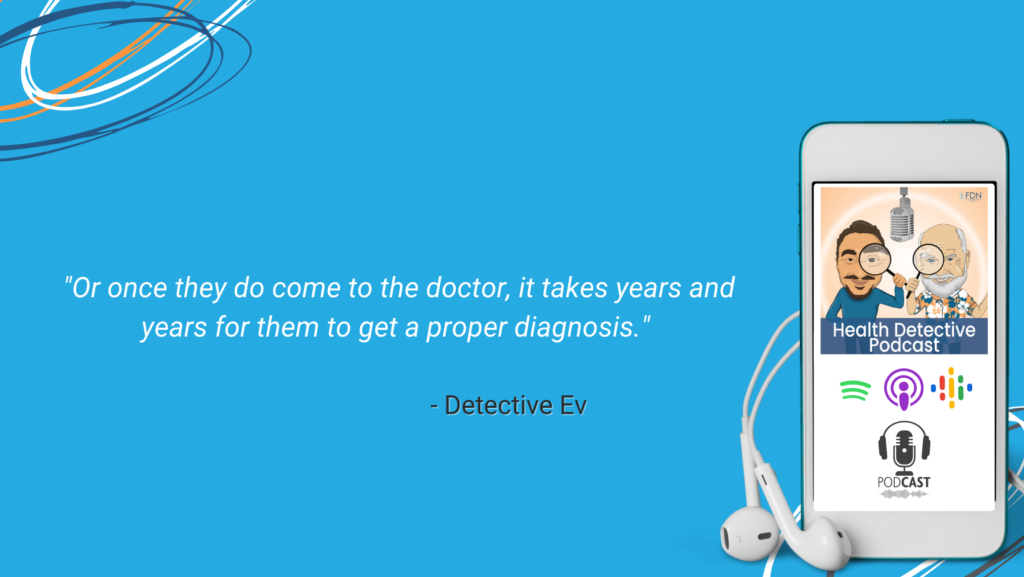
[00:40:14] Detective Ev: Obviously, people like you and I, we’re involved with so much information, it’s hard to retain it all. But I remember something about autoimmune diagnoses and just how many autoimmune diseases (because it’s way overrepresented in women that deal with this stuff.), they don’t go diagnosed. Or once they do come to the doctor, it takes years and years for them to get a proper diagnosis.
This is an anecdotal example. My mom, it was seven years for her to get diagnosed with Grave’s disease, despite having those exact same symptoms the entire time. It was the same condition, but then someone finally figured out that it was Grave’s disease.
I mean, sure, grant you, Grave’s disease is not something you hear about every day. You know, I get that, but still, we just do not have a great system yet. You’d think that this is where they’re the best, diagnosing this stuff. But I mean, Western medicine, a lot of the times, can’t even do that. That’s why it’s really important that we do combine both of these things together.
FDN Doesn’t Need Diagnoses to Help Clients
Hear me out on this people that are listening, we didn’t necessarily need a diagnosis of Graves’ disease to help my mom. Western medicine requires a diagnosis of Graves’ disease to help my mom. We still would’ve done our stuff. We would’ve still done diet, rest, exercise, stress reduction, supplementation, and it would’ve helped.

If Western medicine doesn’t have that diagnosis, there’s only so many things that they can do. And yes, I hear this all the time. I’ve never heard a man say this, I have heard it with women, that it is kind of just in your head or whatever. I definitely have had doctors play me off and not take it seriously, but it’s never been with those comments. It was never like, oh, you’re just stressed out. I think that’s something that almost exclusively they throw at women and it’s not fair.
[00:41:38] Nattha Wannissorn: And I think content marketing is going to change that, right? Whether you like it or not, Google is becoming a health company and people are going to Google their stuff. Obviously, doctors don’t like it. Maybe we don’t like it when people just Google other stuff and come to us.
But we do have to stick up to our doctors and do our research. You can’t hand out our health and our future to anyone.
[00:41:57] Detective Ev: Yep. Well, I love talking to you. I mean, I cannot believe how fast this is going by and I want to make sure I get time to talk about what you do and stuff.
So, with all your research, all these certifications, degrees, the background that you have, what is it that you do now? Like who do you help and how do you help them?
Former Cancer Researcher Found Her Calling in Medical Writing
[00:42:13] Nattha Wannissorn: I found my calling doing medical writing. I’m going to give this sad story. My family Googles me before they’ll listen to me because, you know, we have family members who don’t listen to us when we give them the natural health stuff. But this is their sign.
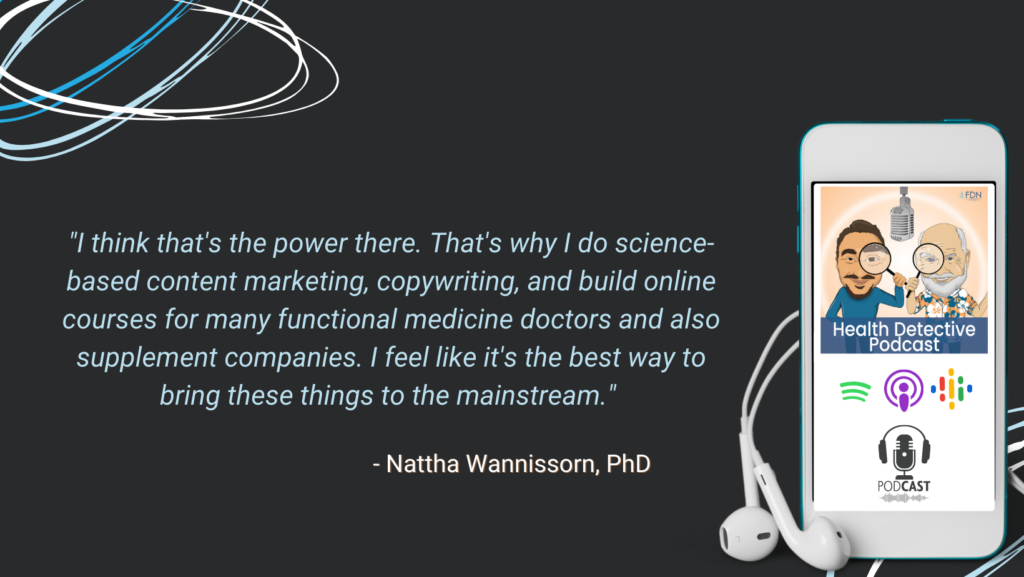
I think that’s the power there. That’s why I do science-based content marketing, copywriting, and build online courses for many functional medicine doctors and also supplement companies. I feel like it’s the best way to bring these things to the mainstream.
[00:42:45] Detective Ev: Well, that’s a very specific thing to find one’s passion in. So I believe you, that it is your passion, cause I don’t think many people have told me that before. That is pretty cool. You’re right. It is one more essential piece.
We need people on all ends of this helping out in many different ways. I mean, for some people that is going to be their thing. That’s cool.
[00:43:02] Nattha Wannissorn: It’s a grassroots movement to show people that there is science behind us and convert them at that level. I think it’s extremely important to bringing the clinical outcomes to the community at large.
[00:43:14] Detective Ev: Just to be clear then for someone listening, if they do think you’re cool, you’re not taking clients then in the sense of coming for a health reason per se. It would be more like a practitioner that needs support or a doctor that needs support with this aspect of things.
Where to Find Nattha Wannissorn, PhD
[00:43:25] Nattha Wannissorn: Occasionally, I would get like an impossible kid, and they’d be like, do you find anything on PubMed about this? Because you know, they’ve seen a bunch of different people and doctors, and haven’t seen the results that they’re looking for.
But our main thing is the online content, copies, and courses that’s very deep, and science-based, and high integrity.
[00:43:47] Detective Ev: So you only take the clients if it’s like extremely complicated and it’s a challenge?
[00:43:51] Nattha Wannissorn: I’m drawn to that kind of problem, but I wouldn’t say…
[00:43:55] Detective Ev: Yeah. gotcha. So yeah, if you got something that no one else could help with, Nattha’s your person and you do sound like you could be that person.
Now with that said, listen, we have a bunch of practitioners that listen, we have doctors that listen. If someone is interested in your services, where can they find you?
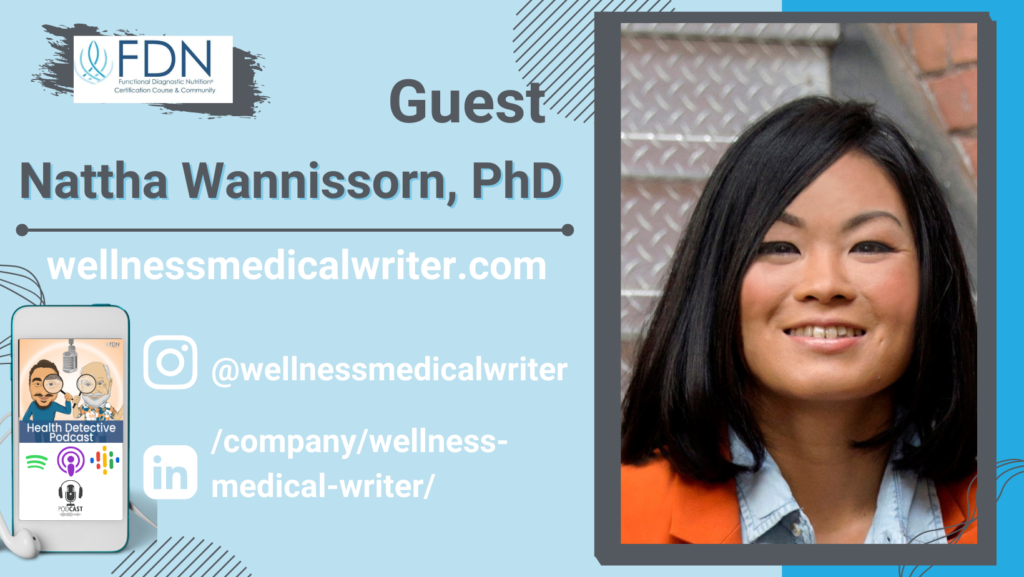
[00:44:07] Nattha Wannissorn: Yeah. Go to wellnessmedicalwriter.com or, email me at Nattha at wellnessmedicalwriter.com. We can book a 30-minute call and see how we can help you.
Click here to find Nattha on LinkedIn
Click here to find Nattha on Instagram
[00:44:20] Detective Ev: Very cool. We will have that in the show notes, of course.
Health Detective Podcast Signature Question
Now Nattha, we have a signature question that we always finish up with on the Health Detective Podcast. The question is this, if I could give you, in this case, a magic wand and you could get every single person in this world to do one thing for their health, whether that’s literally do one thing or stop doing one thing, what is the one thing that Nattha would get them to do?

[00:44:44] Nattha Wannissorn: Oh boy! Hmm. Oh, magnesium. Yeah, I think that that would improve everyone’s health. I think magnesium is a big one because nearly everyone is low in magnesium these days. It’s a big contributor to all kinds of health issues. I know a lot of people will have trouble changing the diets or changing the habits in other ways, so I would start with that.
Conclusion
[00:45:07] Detective Ev: All right, everyone. Well, that’ll wrap it up for today’s episode. If you like the content that we are producing and sharing with you, please consider leaving us a five-star review on Apple and or Spotify. If you did that, we would love you even more than we already do.
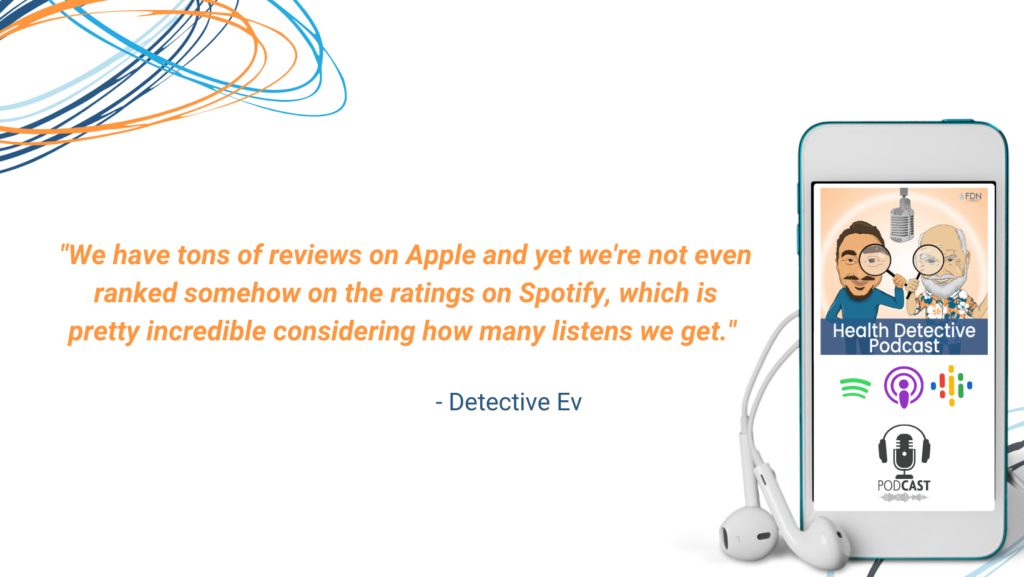
I’m going to put a little emphasis on the Spotify one, please. Cause you guys are amazing. We have tons of reviews on Apple and yet we’re not even ranked somehow on the ratings on Spotify, which is pretty incredible considering how many listens we get. So, I don’t know how that’s happened, but if you would be so kind as to leave us a rating there, that would be wonderful.
There are millions of people out there right now that don’t even know this information exists. The higher we can boost this up, the better the odds that they can hear this and actually have a chance of healing. So, we’d greatly appreciate it. Just search for the Health Detective Podcast on Apple or Spotify. Leave us a rating there. A simple five-star is great. If you can leave us something written that is even better.
I am looking forward to talking to you guys again soon. But until then, please take care. You can always visit us at functionaldiagnoticnutrition.com.

